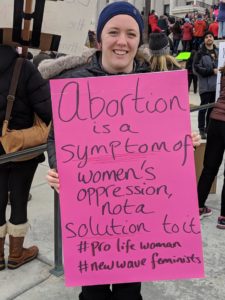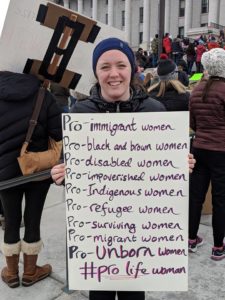The Women’s March on Washington considers pro-life feminism to be a dangerous oxymoron. A pro-life group called the New Wave Feminists was briefly listed as a co-sponsor of the first Women’s March, but outrage erupted once the news of their involvement hit the internet. According to mainstream feminists, intersectional feminism doesn’t include espousing pro-life beliefs. Some activists went so far as to describe the decision to include New Wave Feminists as “embarrassing and actually nauseating.” In the face of public outcry, the national organizers disinvited New Wave Feminists and said, “The Women’s March’s platform is pro-choice and that has been our stance from day one … We look forward to marching on behalf of individuals who share the view that women deserve the right to make their own reproductive decisions.”
When the organizers say that they march on behalf of individuals who share their views on reproductive justice, they explicitly exclude me and thousands of other pro-life feminists. I know that I am not welcome at a march that lists unrestricted access to abortion as a priority in its Definition of Principles. I know that mainstream feminists think that I can’t be a feminist because I do not advocate for abortion rights. I know that the pro-life movement has a bad name due to its political alliance with the Republican party and the alt-right.

Despite knowing that I am “not a real feminist” and expecting that I might not be welcome, I still attended the Women’s March on Utah in January of 2019.
I’m not pro-life because I want to oppress women or because I have internalized the misogyny ingrained within our culture. I’m pro-life because it’s a scientific fact that a new human organism is created when a sperm and ovum meet and create a zygote. “Human Embryology and Teratology,” a widely used embryology textbook, says that “although life is a continuous process, fertilization is a critical landmark because, under ordinary circumstances, a new, genetically distinct human organism is thereby formed.” People of good faith can disagree with one another about whether this new human organism is a human person deserving of the same moral protections that we offer post-birth human beings. Personally, I am of the belief that humans are deserving of protection from the first moment they exist. Of course, there are many complicated arguments for and against abortion that deserve consideration, but for now, I want to talk about why I believe it’s not an oxymoron to call myself a pro-life feminist.
Pro-Life, Pro-Woman
The common belief that women need access to abortion in order to be able to participate as equals in our society is a mark of misogynistic cultural and economic systems. These same systems consider male bodies to be normative and they deny women social and economic opportunities because of the biological fact of their fertility. Sarah Weddington, the lawyer who represented Jane Roe in Roe v. Wade, told the Supreme Court that “a pregnancy to a woman is perhaps one of the most determinative aspects of her life. It disrupts her body. It disrupts her education. It disrupts her employment. And it often disrupts her entire family life.” She further went on to argue that women should be able to choose to terminate pregnancies because of these disproportionate impacts. In other words, women need abortion to be able to participate in society unimpeded by unwanted pregnancies.
A society that makes women get abortions in order to participate in the economy, go to school or take care of their children is a deeply broken and misogynistic society. Our society discriminates against pregnant women, offers abysmally poor maternal healthcare and refuses to offer affordable childcare or parental leave. It offers far fewer child benefits than other countries, gives rapists parental rights and underpays women in comparison to men. The barriers to keeping a pregnancy are even greater for women of color, who face a maternal mortality rate three times higher than that of white mothers. Those who do take themselves and their children home are expected to support their families while earning 21 percent less than white women.
I don’t want women to be blamed, shamed or criminalized for getting an abortion. Rather, I want to create a society in which women don’t need abortions, where pregnancy is not an obstacle that prevents their equal treatment with men. I want pregnant students to be able to access accommodations at school so that they don’t have to choose between their children and their degrees. I want women in the boardroom and women behind the fast food counter to know that they won’t be fired or passed over for promotions if they choose to continue their pregnancy. I want rape victims to be financially and socially supported so that they have the choice to keep a child that they never planned on.
Abortion is a symptom of women’s oppression, not a solution to it. So long as women feel the need to obtain an abortion in order to preserve their education and participate in the workforce, women can never be truly equal to men.
Pro-Life for the Whole Life

My pro-life beliefs are as intersectional as my feminism. I count myself as a member of the New Pro-Life Movement, which says that “our movement does not focus on the right to life of the unborn within an ethical vacuum, but instead adopts an intersectional approach, which recognizes the threat to unborn life as present within aninterconnected web of power-structures. Within this web, it is essential that we not neglect women’s rights, or other human rights, in pursuit of a ‘single-issue’ crusade. For this reason, we especially welcome feminist activists who share our concern for opposing those societal evils that drive women to abortion: poverty, abuse, environmental dangers, rape, lack of medical care, workplace and religious discrimination, pressure from parents and boyfriends, etc.”
Groups like New Wave Feminists and the New Pro-Life Movement are truly pro-women and pro-life. They bring #bottles2theborder and build women’s healthcare apps. They advocate for all human life and fight against “unjust war, gun violence, torture, euthanasia, social injustice, environmental degradation, racism, and all other forms of discrimination.” If a group is going to call itself pro-life, it has to advocate for a consistent life ethicbecause otherwise, they are just pro-birth.
My Experience at the Women’s March
I wholeheartedly agree with the criticism that most pro-life advocates are only pro-birth. I understand that the mainstream pro-life movement’s exclusive focus on abortion has made feminists suspicious that pro-lifers are really only pro-birth and transparently more interested in controlling women’s bodies than they are in actually protecting human life in all its stages. I understand these reservations, so I marched to show my fellow feminists that it is possible to be both an intersectional feminist and opposed to abortion. I marched to advocate for a woman’s right to equal pay, to adequate healthcare and to a life free from gender-based violence and discrimination. I marched in solidarity with women at the border, women who have been victims of rape and refugee women who are in search of a better life for themselves and their families. In short, I marched because I am a feminist and I want to protect human life in all its stages.
Attending the Women’s March while carrying pro-life posters was nerve-wracking. There’s no love lost between the mainstream feminist and pro-life movements, and occupying the no man’s land in between is uniquely uncomfortable. I got a few side-eyes when my fellow protesters read my posters, but otherwise, no one acknowledged my strange hybrid feminism. I was honored to be able to march as a pro-life feminist alongside hundreds of other women and men committed to furthering the cause of justice for women and for all marginalized groups.
Although Roxanne Gay, a feminist icon, said that “intersectional feminism does not include a pro-life agenda,” I will keep marching on as a proud pro-life feminist.



@MW.NOFACE • Mar 15, 2019 at 2:38 pm
I appreciate you sharing your side of the story, I’ve always wanted to hear the first hand opinion of a Pro-life feminist and you clearly know your facts and are wholehearted in defending your stance which I applaud. I have a few questions regarding the overall oxymoron of the conservative pro-life position. I understand that this is a very complicated argument, hence why our country is so utterly divided on the issue. You’ve broken down how Pro-life and feminism are not mutually exclusive, however does the same apply being an environmentalist, or pro-military, or anti-immigration, or supporting the NRA? Combinations like these paired with being Pro-life confuses me. I’m much more of a realist so my reasoning for being pro-choice is that of a numbers game and limiting our population. However I am also an involved environmentalist and I don’t see how one can be pro-life along with that? Considering how much the numbers of our population affects the negative impacts to our planet. I think that it is fair to say that the equation is pretty cut and dry; more people = less resources + more crime + more poverty + overall just more suffering. A child that is conceived under circumstances where an abortion is desired is more than likely in a household that is far from capable of taking care of a child at that current time for whatever reason that may be. Doesn’t it just make sense to end that suffering before it even begins? Obviously we never know the outcome of that child’s situation but if we’re being realistic here it’s going to have a significant uphill battle that will statistically wind up in the viscous cycle of crime and poverty with potential to exponentially increase that calamity. It seems hypocritical when ideologies of the conservative pocket book are mixed with “pro-life”, supporting the military or the NRA doesn’t seem to me like the most life supporting institutions. Now I know that the babies aren’t trying to kill us like war, or other threats that might warrant supporting the NRA and the military, but I think that the point still stands particularly from the more pragmatic argument behind the irony of being pro-environmentalism and pro-life at the same time. I think it’s great that we can have a productive conversation on a platform for students I mean no offence, just curious where you stand. Thank you.
– mwnf